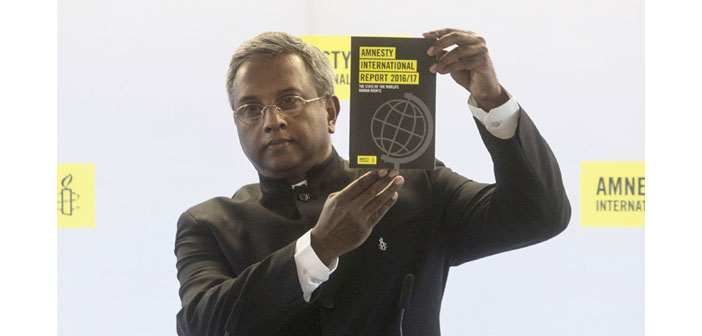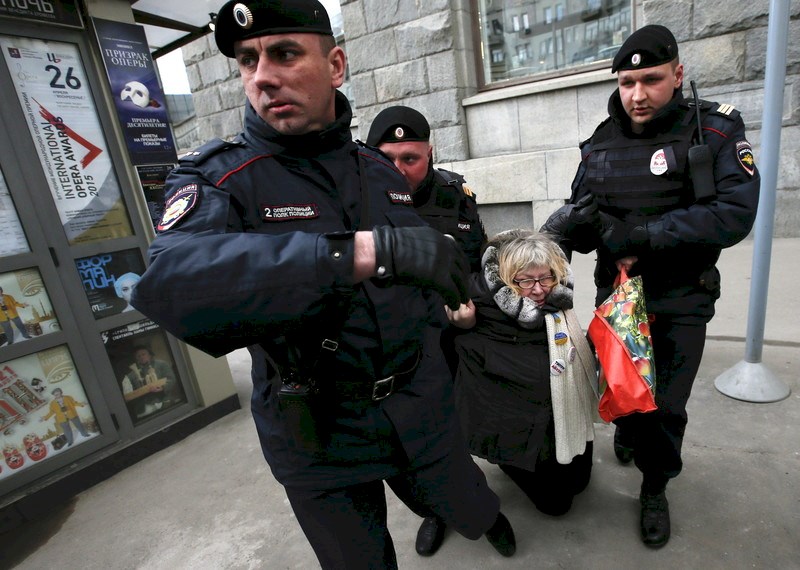"Siyasetçilerin nefret söylemi 1930’lardan beri bu kadar artmamıştı"


“Dünyanın İnsan Hakları Durumu” isimli rapor, dünyanın çeşitli yerlerinde yaşanan silahlı çatışmaları, sivillere yönelik saldırıları, devam eden mülteci krizini ve siyasetçilerin ayrıştırıcı ‘şeytanlaştırma politikaları’nı vurguladı. Uluslararası Af Örgütü, insan haklarına karşı küresel bir gerileme yaşandığını ve kitlesel zulümlere karşı tepkilerin zayıfladığını vurguladı.
Raporla ilgili açıklama yapan Uluslararası Af Örgütü Genel Sekreteri Salil Shetty, "2016 yılı, "biz ve onlar" denilebilecek nefret ve korku söyleminin kullanıldığı ve bu söylemin 1930'lardan beri görülmeyen bir seviyede arttığı bir yıl oldu. Kendilerini 'düzen karşıtı' olarak niteleyen gittikçe daha fazla sayıda siyasetçi, insan gruplarının izini sürerek, onları günah keçisi ve insanlık dışı ilan ederek, zehirli bir gündem kullanıyor" ifadelerini kullanarak ve Trump, Orban, Erdoğan veya Duterte’yi hatırlattı. Raporda özellikle ABD Başkanı Donald Trump’ın seçim kampanyasının, ‘daha öfkeli ve daha ayrıştırıcı politikalar’ eğilimine örnek olabileceğini belirtiliyor. Bunun yanı sıra dünyadaki birçok siyasi liderin gelecekteki güçlerini korku, suçlama ve ayrışma anlatısı üzerine kurdukları saptandı.

2016’de hükümetlerin savaş suçlarına göz yumduğu, özgür ifadeyi ihlal eden yasaları yürürlüğe koyduğu, işkence ve toplu gözetimi meşrulaştırdığı ve polis baskısını arttırdığı görüldü. Ayrıştırıcı söylemlerin özellikle feministlere ve LGBTİ’lere yönelik olarak arttığına dikkat çekildi.
“Hükümetlere baskı zamanı”
Uluslararası Af Örgütü, krizlerin daha da artabileceğini konusunda uyardı. Shetty, “ülkeler temel insan hakları taahhütlerinden geriye doğru adım attıkça, insan hakları korumalarını ortadan kaldırmaya cesaretlenen liderlerin artma riski o kadar artar” dedi.
Shetty, "Hükümetlere, insan haklarını savunmak konusunda güvenemeyiz; her birey kendi hükümetine insan hakları ihlalcilerine yönelik ne yaptıklarını sormak ve sorgulamak zorunda” dedi.
36 ülke mülteci hukukunu ihlal etti
Raporda devam eden mülteci krizine dair tespitler de yer alıyor. Buna göre 2016’da 36 ülke mültecileri, hakları risk altında olan ülkelere hukuk dışı şekilde geri göndererek uluslararası hukuku ihlal ettiği. Öte yandan hükümetler, ayrıştırıcı söylemlerini en çok mülteci ve göçmenler üzerinde yoğunlaştırdı. Raporda, Trump’ın 7 Müslüman ülkeye vize sınırı koyduğu tartışmalı kararname ve Avrupa Birliği ile Türkiye arasında imzalanan ‘Geri Kabul Anlaşması’nda da bahsediliyor. Çin, Mısır, Etiyopya, Hindistan, İran, Tayland ve Türkiye başta olmak üzere pek çok ülkede göçmenlerin ağır baskılara maruz kaldığını belirten raporda, Avustralya hükümetinin mültecileri Nauru ve Manus Adaları’nda mahsur kalmalarına sebep olarak kasıtlı şekilde korkunç acılar çektirdiği bilgisi de yer aldı.
6 aylık OHAL’de 40 bin yargılama
Örgütün yıllık raporunda Türkiye’deki gelişmeler, ifade özgürlüğü, toplanma özgürlüğü, işkence ve diğer kötü muameleler, aşırı güç kullanımı, cezasızlık, silahlı gruplar tarafından gerçekleştirilen ihlaller, mülteciler ve sığınmacılar ile ülke içinde yerinden edilen kişiler başlıkları altında inceleniyor.
Özellikle 15 Temmuz Darbe girişiminden sonra yaşananlara değinen rapor, “Darbe girişiminin ardından hükümet memurlar ve sivil toplum üzerinde çok büyük baskı oluşturdu. Fethullah Gülen hareketiyle bağlantılı olmakla suçlananlar bu baskının ana hedefiydi” değerlendirmesinde bulundu. Örgüt, altı ay süren olağanüstü hal süresince 40 binden fazla kişinin yargılanmak üzere tutuklandığını ve gözaltındakilere işkence yapıldığına dair kanıtlar olduğunu belirtti.
Muhalefete şiddet
Raporda, KHK’larla 90 bin memurun ihraç edildiği, 184 medya kuruluşunun, 375 sivil toplum örgütünün kapatıldığı, 12 vekilin tutuklu olduğu, 188 gazetecinin de tutuklandığı belirtiliyor. Ayrıca Hükümetin 49’u DBP mensubu olan 53 belediyenin seçilmiş belediye başkanlarının yerine kayyum ataması da raporda yer alıyor.
Raporda, PKK ve devlet güçleri arasındaki silahlı çatışmaların özellikler Doğu ve Güneydoğu’da devam ettiği belirtirken, sokağa çıkma yasaklarının olduğu bölgelerde ve 15 Temmuz sonrası Ankara ve İstanbul gibi büyük kentlerde polis gözetiminde rapor edilen işkence ve kötü muamelede artış yaşandığını vurguladı. Özellikle Güneydoğu’da 24 saatlik sokağa çıkma yasakları sırasınca insan hakkı ihlallerinin gerçekleştirdiğini belgeleyen rapor, bunları cezasız kaldığına vurgu yaptı. Uluslararası Af Örgütü, kendi örgütlerinden temsilcilerin yanı sıra Güneydoğu’ya gönderilen BM bilirkişi heyeti ve diğer uluslararası sivil toplum örgütlerinin bölgeye sokulmadığını vurguladı.
Sansür arttı
‘Yargının incelemeden onayladığı ve temyiz etmenin mümkün olmadığı kararlar’ nedeniyle internet sansüründe artış olduğuna değinen raporda, internet siteleri, sosyal medya hesapları dahil içerikleri engellendikleri ifade ediliyor.


